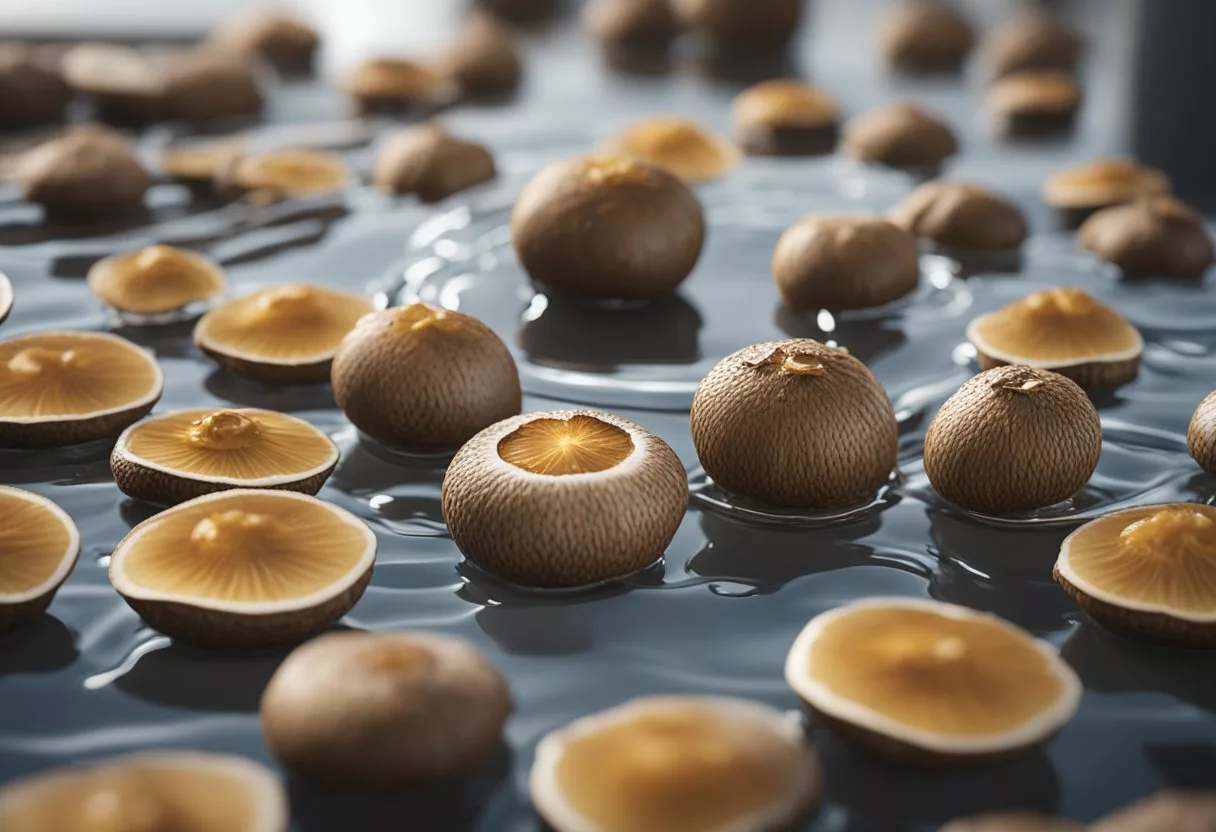Shiitake mushroom tea is gaining popularity as a healthy and natural beverage. Originating from traditional medicine practices in Asia, this tea not only offers a unique and earthy flavor but also comes with numerous health benefits. Brewing shiitake mushroom tea can help boost your immune system and provide essential vitamins and minerals.

Shiitake mushrooms are known for their medicinal properties and have been used for centuries in various cultures. They contain compounds that may help lower cholesterol and fight cancer. Drinking shiitake mushroom tea regularly can support heart health and overall well-being.
Preparing this tea is simple and can be done with either fresh or dried shiitake mushrooms. The process involves soaking the mushrooms, slicing them, and boiling them in water until the flavors are fully infused. Drinking shiitake mushroom tea is an easy way to incorporate more nutrients into your diet while enjoying a soothing and flavorful drink.
Key Takeaways
- Shiitake mushroom tea is a healthy and natural drink.
- It supports immune health and provides essential nutrients.
- The tea can help lower cholesterol and support heart health.
Historical Context

Shiitake mushrooms boast a deep historical significance and have been integral to the cuisines and medicinal practices of East Asia. They hold a hallowed place in both China and Japan for their unique flavors and health benefits.
Origin in East Asian Cuisine
Shiitake mushrooms are believed to have been first discovered in the wild forests of East Asia, particularly in Japan and China. They soon became a staple in East Asian cuisine. The earliest known record of shiitake cultivation dates back to 1209 during the Song Dynasty in China. This makes them the oldest known cultivated mushroom.
In Japan, Shiitake mushrooms have been traditionally grown on cut logs in the forests. By placing cut tsuburajii logs where shiitake mushrooms naturally grew, Japanese farmers were able to encourage the mushrooms to grow on the logs, a practice that began during the Nara period. This method preserved the fungi’s natural taste and health properties. Today, shiitake mushrooms are enjoyed worldwide, but they hold a special place in East Asian kitchens.
Traditional Uses in China and Japan
Shiitake mushrooms have long been valued in traditional medicine, especially in China and Japan. In traditional Chinese medicine, shiitake mushrooms were used for their healing properties and were believed to boost immunity, reduce inflammation, and improve general wellness. Their medicinal use can be traced back thousands of years.
In Japan, shiitake mushrooms are not only a culinary delight but also a component of traditional remedies. Known for their umami flavor, these mushrooms were used in various dishes, believed to provide not just flavor but also health benefits. During historical periods, their use extended from the kitchen to traditional healing practices, signifying their integral role in Japanese culture. Today, shiitake mushroom tea continues to be celebrated for its purported health benefits and rich cultural heritage.
Nutritional Profile

Shiitake mushroom tea provides a rich array of vitamins, minerals, and other essential nutrients. It offers benefits such as immune support, energy production, and ample dietary fiber.
Vitamins and Minerals
Shiitake mushrooms are packed with essential vitamins and minerals. They contain significant amounts of Vitamin B such as B6, Riboflavin, and Niacin. These vitamins help in energy production and maintaining overall health.
The mushrooms also provide a good source of Vitamin D, which is crucial for bone health. Key minerals found in shiitake mushrooms include Copper, Zinc, Selenium, and Iron. For instance, a half-cup of shiitake mushrooms contains a high amount of natural copper, supporting healthy blood vessels and immune functions.
Protein and Fiber Content
Though not a major protein source, shiitake mushrooms do offer some protein, contributing to muscle repair and growth. Each serving contains small amounts of this essential nutrient, enhancing the tea’s nutritional value.
Shiitake mushrooms are also noted for their high fiber content. This includes beta-glucans, which are types of fiber that support heart health and digestion. Polysaccharides found in the mushrooms also play a role in immune support. Overall, the combination of protein and fiber makes shiitake mushroom tea a nutritious choice.
Active Compounds
Several active compounds in shiitake mushrooms add to their health benefits. Lentinan helps stimulate the immune system and has been studied for its potential cancer-fighting properties.
Eritadenine is another active compound that supports cardiovascular health by helping to lower cholesterol levels. Additionally, shiitake mushrooms contain sterols, which have anti-inflammatory properties. The presence of these active compounds makes shiitake mushroom tea not just a tasty beverage but a functional one.
Health Benefits

Drinking shiitake mushroom tea offers a variety of health benefits, including bolstering the immune system, managing cholesterol levels, reducing inflammation, and potentially preventing cancer. Each benefit is backed by compounds found in shiitake mushrooms.
Supporting Immune System
Shiitake mushrooms are rich in essential vitamins and minerals that support the immune system. These include vitamin D and zinc, both of which play a critical role in immune function. Consuming shiitake mushroom tea may help the body ward off infections and illnesses more effectively.
Lentinan, a compound found in shiitake mushrooms, is known for its immune-boosting properties. It enhances the activity of white blood cells, which are crucial for fighting pathogens.
Drinking shiitake mushroom tea regularly can be an easy way to incorporate these helpful nutrients into your diet. This can be especially beneficial during cold and flu season.
Managing Cholesterol Levels
Shiitake mushrooms contain specific compounds that can help manage cholesterol levels. Eritadenine, for instance, is a natural compound that inhibits an enzyme involved in producing cholesterol, thereby lowering its levels in the blood.
These mushrooms also have sterols that prevent cholesterol absorption in the gut. This dual action can significantly contribute to better heart health.
By incorporating shiitake mushroom tea into one’s routine, it may be possible to maintain healthier cholesterol levels. This can lead to a reduced risk of heart disease and other cardiovascular issues.
Anti-Inflammatory Effects
Shiitake mushroom tea offers anti-inflammatory properties that can help reduce inflammation in the body. This is particularly important for individuals dealing with chronic inflammation, which can lead to various health problems over time.
The presence of antioxidants in shiitake mushrooms, such as polysaccharides, helps combat oxidative stress. This reduces inflammation and supports overall wellness.
Incorporating shiitake mushroom tea into your daily regimen can be an effective strategy for managing inflammation. This can lead to improved joint health and a lower risk of inflammatory diseases.
Cancer Prevention Potential
One of the notable benefits of shiitake mushrooms is their potential in cancer prevention. Compounds like lentinan have been studied for their ability to inhibit tumor growth and boost the body’s natural defenses against cancer cells.
Lentinan, in particular, has shown promise in enhancing the immune system’s response to cancer cells. It is often used in conjunction with traditional cancer treatments.
While drinking shiitake mushroom tea is not a cure, it may offer supportive benefits for those undergoing cancer treatment or looking to reduce their risk. Regular consumption can be a proactive step toward better health.
Culinary Applications

Shiitake mushrooms have a rich, savory taste that enhances many dishes. They are versatile and can be used in tea, soups, stews, and other culinary creations. Their umami flavor makes them a popular choice in Asian cuisine.
Preparing Shiitake Mushroom Tea
Shiitake mushroom tea is a unique beverage with a distinct umami flavor. To make the tea, start by soaking dried shiitake mushrooms in hot water for 20 minutes. Remove the stems, as they can be tough. Thinly slice the caps to enhance flavor extraction. Place the mushroom slices in boiling water with a pinch of salt, and let it boil until the liquid reduces by half. This process creates a warm, aromatic tea with a savory taste. Some recipes suggest adding ginger, garlic, or even a slice of onion for added depth of flavor.
Integrating into Soups and Stews
Shiitake mushrooms are a perfect addition to soups and stews, especially in Asian cuisine. Fresh or dried mushrooms can be used, each offering a different intensity of flavor. For dried shiitake mushrooms, soak them in hot water to rehydrate before use. They can be added to classic dishes like miso soup, chicken stew, or ramen. Their rich umami profile pairs well with ingredients like ginger, garlic, and onions. Cooking them longer in stews helps release their flavors into the broth, making the dish more robust and satisfying.
Cooking with Dried Shiitake Mushrooms
Dried shiitake mushrooms are a pantry staple and add a deep umami flavor to various dishes. To prepare, soak them in warm water until they soften. They can then be sliced and used in stir-fry dishes, soups, or stews. When cooked, they offer a chewy texture that complements vegetables, meats, and grains. They are particularly popular in Asian stir-fries, where they are often paired with soy sauce, ginger, and garlic. The soaking liquid, rich in mushroom flavor, can be used as a broth base, enhancing the taste of the entire dish.
Cultivation and Harvesting

Shiitake mushrooms are cultivated on logs and involve a thorough process of careful harvesting and proper drying to ensure quality. The methods described here can help in successfully growing and preparing these mushrooms for consumption or sale.
Growing Shiitake on Logs
For successful cultivation, fresh logs with bark intact should be used. Logs typically measure 3-4 feet long and 4-6 inches in diameter. It’s important to inoculate the logs with shiitake spawn by drilling holes spaced 3-4 inches apart in a diamond pattern using a 5/16 inch drill bit.
After inoculation, logs are placed in a shady, moist area to facilitate growth. It can take anywhere from 6 months to a year for the mushrooms to begin fruiting. The shiitake fungi must colonize the outer cylinder of the sapwood for fruiting to start. This process can be helped by soaking the logs in cold water for a few hours.
Harvesting and Drying Processes
Once the mushrooms begin to fruit, they can be harvested when the caps have fully opened but before they begin to flatten. Shiitake mushrooms grow best in early spring or late fall. Use a sharp knife to cut the mushrooms at the base to avoid damaging the log.
After harvesting, drying the mushrooms is critical to preserving them for longer storage. They can be air-dried in a well-ventilated area or using a dehydrator set on low heat. Proper drying ensures that the mushrooms are ready for sale at farmers markets, supermarkets, or grocery stores, maintaining their flavor and extending shelf life.
Preparation Techniques

Preparing shiitake mushroom tea involves steeping fresh mushrooms, enhancing flavor with various additives, and then straining and serving the tea. Each step ensures the final tea is rich in its distinctive earthy flavor.
Steeping Fresh Mushrooms
To begin, rinse fresh shiitake mushrooms under cold water to remove any dirt. Cut off the stems if they are tough, as they can affect the tea’s texture. Slice the mushroom caps thinly to allow for better infusion of their earthy flavor.
Boil 2 to 3 cups of water in a teapot or saucepan. Add the sliced mushrooms to the boiling water, then reduce the heat to a gentle simmer. Let the mixture steep for about 20 to 40 minutes, depending on how strong you want the flavor to be.
Enhancing Flavor with Additives
After the mushrooms have been steeped, consider adding additives to enhance the tea’s taste. Common choices include a pinch of salt for a savory twist or a tablespoon of honey for a touch of sweetness.
Soy sauce can also be added if you want a slightly more robust, umami flavor. For those who prefer a sweeter tea, add sugar or other sweeteners. Remember to mix well to ensure the additives fully dissolve into the tea.
Straining and Serving Methods
Once the tea is ready, use a strainer to separate the liquid from the mushroom slices. This ensures a smooth texture free from chunks. Pour the strained tea into cups.
Serve the tea hot to enjoy its full flavor. Optionally, garnish with a thin slice of mushroom or a dash of soy sauce for a bit of flair. This final touch not only adds to the presentation but enhances the aromatic experience.
Alternative Forms

For those looking to incorporate Shiitake mushrooms into their diet without consuming them directly, there are several options available. These alternatives can offer similar health benefits, including immune support and added nutrients.
Shiitake as a Supplement
Shiitake mushrooms are available in supplement form, often found as tablets or capsules. These supplements provide an easy way to incorporate the medicinal properties of Shiitake mushrooms without needing to cook or prepare them. They typically contain powdered mushroom extract, which retains the mushroom’s nutrients and active compounds.
These supplements are marketed for boosting the immune system and providing antioxidants. Other medicinal mushrooms like Maitake and Cordyceps are also available in supplement form and may offer similar benefits. When choosing a Shiitake supplement, it’s essential to check for quality and any added ingredients.
Tincture and Extract Options
Shiitake mushroom tinctures and extracts are made by soaking the mushrooms in alcohol or another solvent to extract their active compounds. These tinctures are highly concentrated and can be taken by adding a few drops to water or another beverage.
Extracts are available in liquid or powder form and can be mixed into foods or drinks. Like supplements, these forms retain the beneficial compounds of Shiitake mushrooms. While tinctures offer a potent dose, extracts can be more versatile and easier to incorporate into daily routines. Maitake and Cordyceps tinctures are also popular for their health benefits.
Safety and Considerations

Shiitake mushroom tea is a nutritious drink with various health benefits. But it’s important to be aware of possible side effects and interactions with medications before adding it to your diet.
Possible Side Effects
Some people can experience allergies to shiitake mushrooms. This can lead to skin reactions, such as rashes or itching. Consuming shiitake mushrooms in large amounts may also cause stomach upset, including bloating or discomfort.
Additionally, shiitake mushrooms have been known to have antibacterial and antiviral properties. While these can be beneficial, they might also disrupt the balance of gut bacteria when consumed excessively. It’s advisable to start with small amounts and observe any reactions.
Another potential side effect is dermatitis, a condition that causes skin rashes when exposed to sunlight. This happens because of the presence of lentinan, a compound in shiitake mushrooms. If any adverse reactions occur, it is best to stop consumption and consult a healthcare provider.
Interaction with Medication
Shiitake mushrooms can interact with certain medications. They contain bioactive compounds that might affect blood clotting. This means individuals taking blood thinners should be cautious.
People on immunosuppressive drugs should also be careful as shiitake mushrooms are known for their immune-boosting properties, which can interfere with the effectiveness of these medications.
Consumption of shiitake mushroom tea alongside antiviral medications should be monitored to avoid any potential interactions. Always consult a healthcare professional before adding shiitake mushroom tea to your routine, especially if taking any prescribed medicines.
For more detailed information, please refer to the article on Mushroom Tea Benefits and Side Effects.
Frequently Asked Questions

Shiitake mushroom tea offers numerous benefits, from boosting immunity to potentially aiding in weight loss. Preparing the tea at home is simple and requires minimal ingredients.
What are the benefits of drinking mushroom tea?
Drinking Shiitake mushroom tea can boost the immune system due to its bioactive compounds. It may also support cardiovascular health and enhance overall wellness. Some believe it helps in reducing inflammation and improving energy levels.
How can one prepare mushroom tea at home?
To make Shiitake mushroom tea at home, soak dried mushrooms in warm water for 15-20 minutes. Slice the rehydrated mushrooms thinly. Boil water and add the mushroom slices, simmering for 15-40 minutes. You can season with a pinch of salt.
Are there any specific advantages to Japanese Shiitake in tea form?
Japanese Shiitake mushrooms are rich in various nutrients and bioactive compounds. When consumed in tea form, these mushrooms may offer enhanced immune support and anti-inflammatory benefits. They are also known for their unique umami flavor, which enhances the overall taste of the tea.
Where can one purchase Shiitake mushroom tea?
Shiitake mushroom tea can be found at health food stores, specialty grocery stores, and online retailers. Look for high-quality, organic options to ensure the best health benefits and flavor.
Can Shiitake mushroom tea support weight loss efforts?
Drinking Shiitake mushroom tea might help in weight loss by boosting metabolism and reducing fat accumulation. It is low in calories and can act as a healthy beverage choice alongside a balanced diet and exercise.
Are there any potential risks or side effects associated with consuming Shiitake mushrooms?
While Shiitake mushrooms are generally safe, some people might experience allergic reactions, such as skin rashes or digestive issues. It’s important to consume them in moderation and consult a healthcare provider if you have specific health concerns.